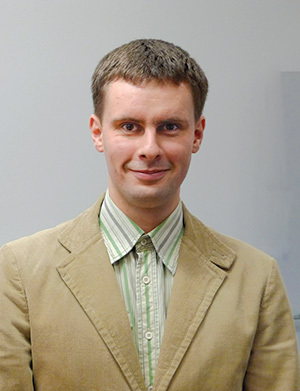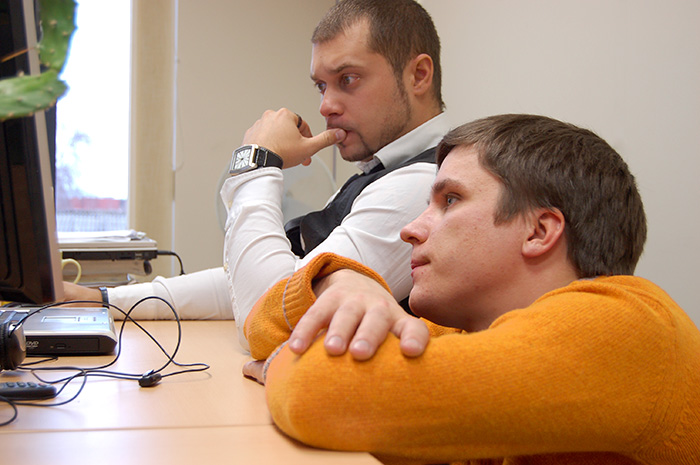Steady development in Lithuania
Published: 23.12.09
Omega has offices both in Norway and abroad. Our technology subsidiary in Klaipeda on the west coast of Lithuania is an important location, and we had a chat with Vadim Naroznij, who is managing the Lithuania office.
 Vadim Naroznij is manager for our office in Lithuania. (Photo: Jon Kristian Bernhardsen)
Vadim Naroznij is manager for our office in Lithuania. (Photo: Jon Kristian Bernhardsen)
Could you give us a general introduction into the tasks performed by Omega’s crew in Klaipeda?
As the name Omega Technology UAB implies, the Lithuanian company deals with whatever the technology department in Omega AS is doing. Actually after the recent split of department 4 in Omega AS into 4a Technology, lead by Peter Øren, and 4b Products, lead by Johnny Vik we also have some people working with 4a and some with 4b.
The Lithuanian company (UAB) consists of only system engineers and one administrative position filled by Loreta Kolesnik. The number has been varying from 5 to 25, and now came to “golden middle” of around 15 which is big enough to provide necessary support and is also manageable by the way Omega works. Usual tasks for a UAB employee would be e.g. development of a new control for Appframe or a rewrite of a Pims module on a new platform. We work tightly with Technology and Products departments, travel often to HQ office in Ølensvåg and stay there for extended periods to get better understanding of technologies used.
Similarly to both technology departments, UAB also supports Omega’s clients, through assignments of system departments, remotely or mobilising on-site. Currently we have people on long-term assignments: Aleksandr Maksanov is staying in Qatar for a 1,5 years now, where he had replaced Edvardas Rimkus, being there for almost 2 years; Saulius Bliudzius is working for Siemens in Oslo for 2 years now and Andrius Jonusevicius is on assignment with BP, working in Omega’s Stavanger office. Lithuanian developers have also been on assignments in Houston, Bonn, Singapore and Moscow. So generally we travel a lot, similar to the way Omega AS spins. Actually in Omega UAB we try to follow Omega AS example as much as possible in areas like office setup, team spirit, HSE, diligence and advantages because we find Omega to be a very attractive, modern, challenging yet caring place to work at. There are a couple of guys from Lithuania working directly for Omega AS in Norway, but this option has not been too popular because of natural reasons: family, friends and other attachments.
How has 2009 been, new challenges and new employees?
2009 has been a tough year for the UAB as well. The number of employees has slightly decreased and it was quite challenging to find enough challenges for everybody. However there were quite a few exiting projects too. For example we have been involved in the Shtokman project in Russia, delivering several Pims modules to a consortium developing one of the world’s largest natural gas fields. Aleksej Sirokij was a central developer here also accompanied by Jevgenij Boldysev working remotely from our office in Klaipeda. The assignment was coordinated by Alf Vetvik on the Omega AS side.
What are your experiences from working in a West European company located in Eastern Europe?
Let’s start with that Lithuania is not considered an Eastern European country, but belongs to Northern Europe, together with the Nordic countries (ref. United Nations Statistics Division). So there is actually not a big difference from experience working in any other European country. At least that is the feeling nowadays, some 18 years after regaining our independence. But I guess Lithuania has a correct location, both geopolitically and historically to provide a “bridge” in between Eastern and Western Europe, especially in the Russian market, since many Lithuanians speak good Russian and also being members of EU provides required mobility of resources. There are many foreign investment companies in Lithuania which is partly caused by availability of “free economical zones” and partly because of the good level of technical education in the country. Many Lithuanian companies become members of bigger European concerns, which I think is a part of globalisation process.
 Aleksej Sirokij and Jevgenij Boldysev immersing in a task at Omega’s office in Lithuania. (Photo: Aleksandr Naroznij)
Aleksej Sirokij and Jevgenij Boldysev immersing in a task at Omega’s office in Lithuania. (Photo: Aleksandr Naroznij)
What impact has the financial crisis had on Lithuania and Klaipeda, both for businesses and the average citizen?
The financial crisis had a fairly significant effect on the state, business and common citizens. The government is trying to cope with the budget deficit. Companies, especially those involved in international markets, were not getting enough income and quite a few went bankrupt. Many people have lost their jobs and national employment agencies are overflowed. However, in the IT area the crisis was not that bad. For example one of the biggest UK banks, Barclays, is establishing their IT department in Lithuania and this is going to create 250 new work places during next five years.
What are UAB’s plans for 2010?
This year Omega Technology UAB has started to actively search for local clients in Lithuania, offering Omega’s software products: Pims, TeamDocuments, Appframe and development services for the market. This opens many exciting perspectives for the company, since it will become more robust and independent, will get more positive image in the community, which is important for both recruiting and marketing. This will also have a positive effect on experience accumulation of UAB human resources. Having local clients will allow for better flexibility related to travelling and will allow some people to be able to work from Klaipeda most of the time.